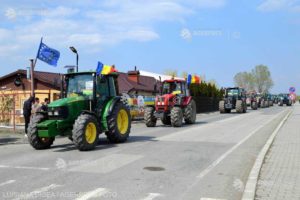Bucharest continues to allow the transit of Ukrainian grain, but is waiting for Kyiv to come up with a plan for exports
The European Commission’s decision not to extend the order stopping the import of cheap Ukrainian grain has reignited the older dispute on this topic and led to new protests from farmers in the affected Central and East European states. The import ban was imposed after the sea routes Ukraine had used to export its products could no longer be used, and large quantities of grain reached Central Europe, affecting the business of local farmers. After the ban approved by the European Commission expired last Friday, the governments of Poland, Hungary and Slovakia announced that they would unilaterally continue to ban Ukrainian grain imports. They claim that they are doing it to protect their economies and farmers from the inflow of Ukrainian products. In response, Ukraine filed lawsuits at the World Trade Organization, considering that such restrictions represent a violation of the international obligations of Ukraine’s neighbors.
Romania did not adopt the radical solution of the three states. Bucharest has announced that grain from Ukraine will continue to transit Romania, provided that Kyiv presents, within 30 days, a plan for its exports. During these 30 days, no Ukrainian grain will be imported, the Romanian Minister of Agriculture, Florin Barbu, told local farmers. Under the future plan, only those in the business of animal husbandry and processing units will have the right to buy grain, and only after they prove they need grain or have insufficient stocks. In addition, the grain will be checked by the Sanitary Veterinary and Food Safety Authority before leaving Ukraine. After negotiations with the Government, Romanian farmers gave up protests for the time being.
Daniel Radu, vice-president of the Forta Fermierilor Association: „We are only talking about imports, as transit will continue. Ukrainian trucks will further cross Romania’s territory, and not only trucks, but also barges, and other freigh transport means, but nothing will remain on Romania’s territory. The grain will be taken directly to the port, where it will be loaded on ships to their final destination. The plan proposed by the Agriculture Ministry must enter into force and start taking effect. A licensing system will not be easy to implement, nor to get, so it will take time. So we feel protected, as farmers, from this risk of the domestic market being flooded with Ukrainian grain”. Farmers in Bulgaria protested, on Monday, throughout the country, to demand a ban on the import of oil, sunflower, corn, wheat and rapeseed from Ukraine. The protests also affected traffic at the northern border with Romania. (Ştefan Stoica, Radio Romania International)











